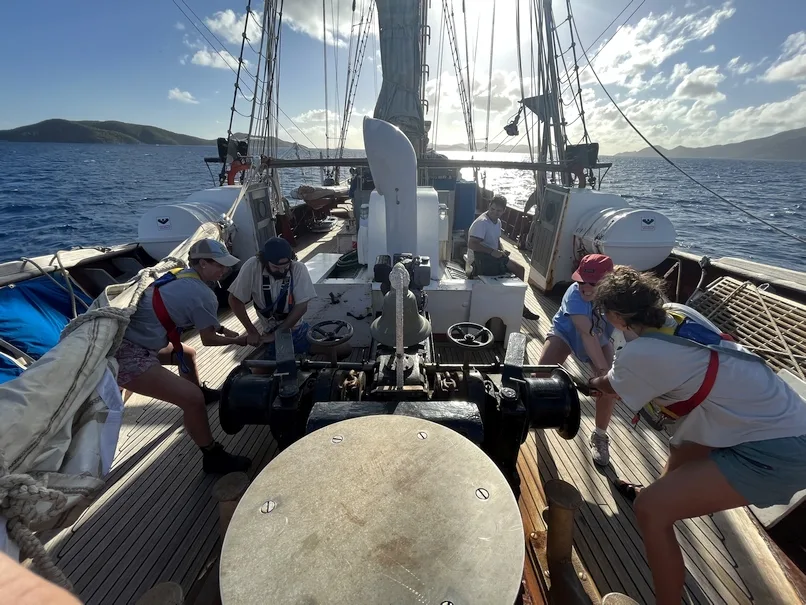Programs Blog
Leaving Francis Bay and Hauling Back by Hand

Author: Will Muir, Engineer
Ship’s Log
Noon Position
18* 21.8’N, 64* 45.1’W
Description of location
At Anchor, Francis Bay, St John, USVI
Today is a transition point from the first part of our trip to the second.
For the last ten days, we have stayed relatively close to shore and students have completed 4 snorkel surveys in various locations. Today, we head for open waters for the next four weeks of our voyage. We have enjoyed largely calm days so far, but we had some mighty gusts of wind yesterday evening, portents of a northerly and then easterly wind that we will have to contend with tonight as we first head east to be clear of the islands and then north once the wind has shifted.
Today was also the first day that students begin rotating into the galley to assist our steward, Will, with making snacks and meals for the day. Audrey, our wonderful deckhand who has been helping Will in the galley these past ten days is now headed back to her watch. Thanks for all you’ve done, Audrey! Ella was our first student assistant steward of the trip, so last night she and Will cooked up a plan for today’s three meals and three snacks – we sure eat well onboard! We were treated to cheesy grits and bacon for breakfast; watermelon and pears for morning snack; couscous salad and chicken wings for lunch; artichoke jalapeno dip and chips for afternoon snack; a hearty chili, cornbread, and salad for dinner; and chocolate chip pumpkin bread for midnight snack! Gotta keep our dawn watch standers properly fed and awake to keep our ship safe as she sails through the night!
Today we got to make use of our windlass’s hand cranks! As it turns out, they are not mere decorations, but essential pieces of our ship’s gym equipment! After lunch, as we were hauling back 2.5 shots (about 225 feet) of chain on our port anchor, a part of our windlass motor failed. Well of course we still wanted our anchor back, and with about 60 feet of chain still paid out, C-watch, who was on duty, jumped in to help! It took us probably 45 minutes to get it all back, but with great spirits, a lot of energy, and plenty of people jumping in to take turns sweating away on the cranks – two people per side – we were able to haul back about 600 pounds of chain and our 1000-pound anchor! Good work!
It’s been a good trip so far, and we’re all looking forward to this next part: the open ocean. Snorkeling is over, but a routine will soon set in as we get used to being at sea for an extended period: dawn watch will be a favorite chance to admire at the stars, learn some new constellations, and get to know watch mates even better; class time every day at 1430 for community announcements and watch reports, both scientific and navigational; and everyone will become familiar and comfortable with all of the answers to that long list of questions Katherine posed in her blog a week ago.
(Sil would like to regretfully inform his family that he misplaced his glasses on the beach at Francis Bay. I guess he was having too much fun!)
– Will Muir, Engineer
Contact: Douglas Karlson, Director of Communications, 508-444-1918 | [email protected]
Recent Posts from the Ships
- SEA Writer 2022, Magazines From the Summer SEA Quest Students
- PIPA Alumni Reconnect with Children of Kanton
- Woods Hole Welcomes Incoming Class of PEP Students
- Muhlenberg Student Finds Perfect Study Abroad Experience with SEA Semester
- SEA Student Describes Pacific Exploration for University of Denver News
Programs
- Gap Year
- Ocean Exploration
- High School
- Science at SEA
- SEA Expedition
- SEAScape
- Pre-College
- Proctor Ocean Classroom
- Protecting the Phoenix Islands
- Sargassum Ecosystem
- SPICE
- Stanford@SEA
- Undergraduate
- Climate and Society
- Climate Change and Coastal Resilience
- Coral Reef Conservation
- Marine Biodiversity and Conservation
- MBL
- Ocean Exploration: Plastics
- Ocean Policy: Marine Protected Areas
- Oceans and Climate
- Pacific Reef Expedition
- S-299 Summer Session
- The Global Ocean: Hawai'i
- The Global Ocean: New Zealand